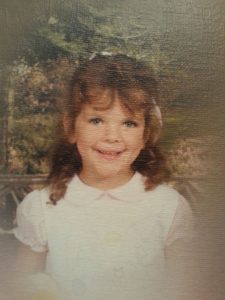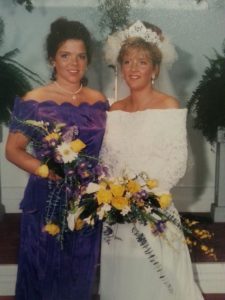Why We’re Here: Millie Webb
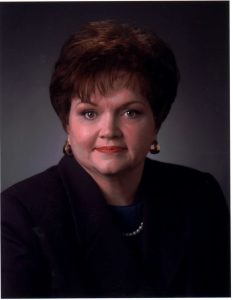 Millie Webb never asked for this story. She didn’t care if she got to shake hands with the President. She wasn’t looking to inspire thousands of people. She didn’t care about being on TV or radio and she had no goal of speaking at a press conference from the Rose Garden of the White House lawn. In fact, for as much good as she hopes she’s accomplished, if she could trade all of it for a life without this story, she would.
Millie Webb never asked for this story. She didn’t care if she got to shake hands with the President. She wasn’t looking to inspire thousands of people. She didn’t care about being on TV or radio and she had no goal of speaking at a press conference from the Rose Garden of the White House lawn. In fact, for as much good as she hopes she’s accomplished, if she could trade all of it for a life without this story, she would.
On August 14, 1971, Millie, who was 7 months pregnant, was in the car with her husband, Roy; their 4-year-old daughter, Lori; and their 19-month-old nephew, Mitch. They were headed home after going to pick up fresh peaches. (Millie had been craving them and Roy had bought her a bushel. But, he forgot them at work, so they had gone to get them.)
Suddenly, a driver with a .08 blood alcohol content (BAC) rear-ended them and caused the car to burst into flames. Millie and both children were thrown from the car. As it toppled over them, gasoline and flames spewed onto their bodies. Roy did his best to save them using his bare hands to extinguish the flames from his burning family.
Millie sustained a broken neck and burns on 75% of her body, including a partial mastectomy by fire. To save her unborn baby, doctors had to perform an emergency c-section three days after the crash. But because of her condition, they felt it was unsafe to sedate her in any way. The c-section was performed naturally. Kara was born two months pre-mature and legally blind as a result. It was eleven days before Millie would see her newborn daughter.
In 1971, no burn victim had ever survived with over 60% burns on their body. There was no hope for Millie’s survival. But she miraculously held on! Her oldest daughter, Lori, lay suffering from burns on 75% of her little body for two weeks. When she died, on August 28, doctors decided that Millie’s condition was too fragile for the devastating news. When she finally was told that Lori had died and been buried, she was still so bandaged that couldn’t even reach up to wipe the tears from her own eyes.
Eventually, she was released from the hospital and began a long road to physical recovery that plagues her to this day. She has had more than 40 surgeries over the years. She still walks with a slight limp and, after 40 years of therapy, still can’t straighten her arm.
“Although originally my scars were a painful reminder of my trauma, I began to see my scars as a living testimony of resilience and rebirth,” says Millie. In 1981, she helped found the Tennessee chapter of Mothers Against Drunk Driving (MADD) and began serving as a Victim Advocate, helping other victims of drunk driving cope with the emotional aftermath of a crash.
In 1988, she was part of a crisis response team sent to help victims of the Kentucky Bus Crash, the worst alcohol related crash in U.S. history. A drunk driver had hit a bus head-on as it returned from a church outing, causing it to burst into flames, killing 24 children and 3 adults and injuring 30 others. One little girl, in particular, found comfort in Millie’s arms.
“She would rub my burn scars and talk and talk about how terrible it was to watch her friends burn alive. She felt at ease with my arms around her,” Webb says. “There is beauty in that. Scars are ugly. But she saw me living with them and knew that she would too.” The child hadn’t been able to open up to anyone, even her parents, but she felt safe talking to Millie.
In 1991, Millie began serving on the MADD National board. Over the next several years, she was part of a fight backed by research, other determined .08 victims, and a few dedicated legislators to lower the legal intoxication limit to .08 nationally. She knew it would save lives. She had experienced its devastation first-hand. When she became MADD National President in 2000, the law was finally passed amid continuing opposition from the alcohol industry and many in the general public. She attended the bill signing in the Oval Office with President Bill Clinton.
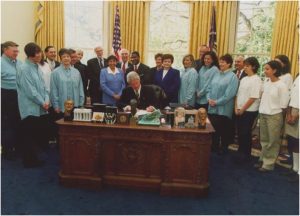
As they were walking out together for a reception and press conference in the Rose Garden where Millie was to introduce the President to the media, Millie told him, “I’m not going to tell you my story, but I just want you to know how much this bill means to me and the other .08 victims.” She told him how painful it was to be told that her daughter had died and been buried and that she hadn’t even been able to wipe her own tears. “It was like salt in the wound,” she said.
He took her hand and said, “Millie, that’s what the world needs to hear.” He encouraged her to share her story during the press conference and so she did.
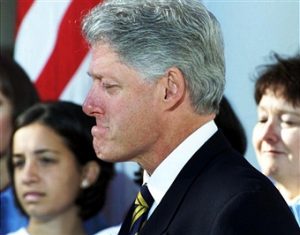
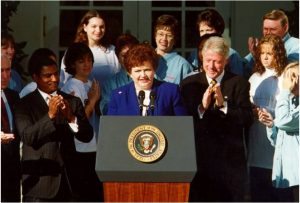
In 1971, Millie Webb had no desire to be the National President of an organization with a mission to end drunk driving. She had no plans for a story that would be heard all over the country and prompt legislative support from offices as high as the Presidency. But the story is hers. She took the story that had been given to her and she found strength in it – a strength she shares with others.
Her term as MADD National President ended in 2002. Today, she still serves on the Ad Hoc Committee for Victims and Programs for the MADD National Board. She also serves on the MADD Tennessee State Advisory Board as the Victim Services Chair – a role near and dear to her heart. She still speaks and shares her story regularly at Victim Impact Panels helping offenders understand how important their choices are and how even one can affect their lives and the lives of others for a lifetime. And she still works tirelessly to end drunk driving by advocating for legislative change to continually improve DUI laws. “My dream is that one day irresponsible behavior will come face-to-face with responsible justice,” she says.
She is truly an inspiration to all who know her. “For years, people would introduce me as ‘the lady who was burned.’ It was like I didn’t even have a name,” Millie shares. All these years later, she feels a sense of purpose and accomplishment has changed that. “My scars still remind me, but they don’t define me,” she says. Instead, her scars shine like the brightest stars, sending a message of hope to all those who doubt that they can learn to live again after tragedy. And they are beautiful.
“Life can never be the same after a drunk driving crash, but it can be good again.” – Millie Webb

